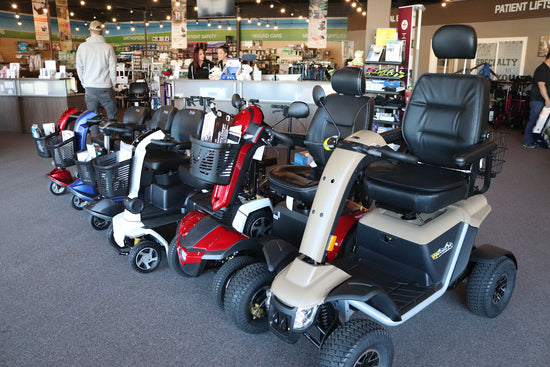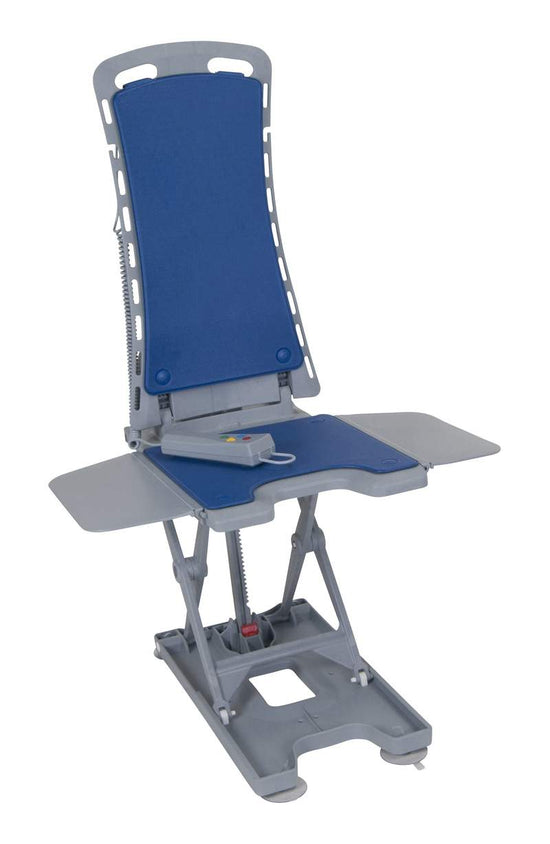When it comes to choosing the right mobility device, the decision between a mobility scooter and a power wheelchair can feel overwhelming. Both options are designed to enhance independence, improve quality of life, and offer reliable transportation for people with limited mobility. However, these two devices serve different needs and lifestyles.
If you or someone you care for is trying to regain freedom of movement due to age, injury, or a medical condition, understanding the difference between a mobility scooter and a power wheelchair is essential. Your choice will impact daily comfort, accessibility, travel ease, and how well the device integrates with your routine.
This guide breaks down the differences between the two devices and helps you determine which one fits your mobility goals best. From maneuverability and battery life to indoor/outdoor use, we’ll cover everything you need to make an informed decision.
Key Differences Between Mobility Scooters and Power Wheelchairs
At first glance, mobility scooters and power wheelchairs may appear similar, but their design, function, and intended use differ significantly. Understanding these differences helps narrow down your options.
Mobility scooters generally have a tiller and handlebars for steering, making them easier for users with good upper-body strength and coordination. They often have three or four wheels and are ideal for longer distances, especially outdoors. These scooters are well-suited for individuals who can walk short distances but need assistance for extended travel or errands.
Power wheelchairs, on the other hand, use a joystick for navigation, making them ideal for users with limited upper-body strength or more severe mobility impairments. These wheelchairs are more compact and can turn in tighter spaces, offering excellent indoor maneuverability.
The seating setup also differs: scooters often feature swivel seats with less adjustability, while power wheelchairs provide advanced positioning options for posture support. This makes wheelchairs preferable for users needing longer-term seating or specialized cushioning.
Ultimately, the choice depends on how and where the device will be used. If you need something for outdoor use and travel, a mobility scooter might be the right fit. For indoor navigation and continuous seating support, a power wheelchair could serve you better.
Understanding Your Mobility Needs and Lifestyle
Before choosing a device, evaluate your daily routine and specific mobility challenges. Are you mostly indoors, or do you frequently go out for errands or social activities? Do you have the strength to steer a scooter, or would a joystick-controlled wheelchair suit you better?
If you’re looking for a device to help with quick trips to the grocery store or outdoor leisure, a mobility scooter can offer both convenience and simplicity. It's a solid option for users who can still stand or walk short distances but need help covering longer stretches.
In contrast, someone who needs full-day support and cannot transition in and out of a chair easily may be better suited for a power wheelchair. Power chairs are typically more customizable and comfortable for long-term seating, and some models offer features like recline and elevation.
Also, consider your home setup. Are doorways wide enough for a larger scooter, or would a compact wheelchair be more practical indoors? Answering these types of questions will guide you toward the right option and help ensure your choice supports both independence and safety.
Maneuverability and Ease of Use in Different Environments
Where you plan to use your mobility device plays a major role in your decision. Both scooters and wheelchairs perform differently indoors and outdoors, and knowing which environment you’ll spend more time in can guide you to the right choice.
Mobility scooters are best suited for outdoor use. Their larger turning radius and wider frame make them great for sidewalks, parks, and shopping centers but less ideal for tight indoor spaces. Steering a scooter also requires more room, so navigating through narrow hallways or around furniture may be challenging.
Power wheelchairs are designed for tighter indoor maneuvering. Their joystick controls allow for a much smaller turning radius, making them more effective in compact homes or crowded spaces. This is particularly useful for users who live in apartments or homes not optimized for accessibility.
That said, there are models in both categories designed for mixed environments. Compact scooters and outdoor-ready power wheelchairs exist, but there’s usually a trade-off in range or comfort.
When ease of navigation is a priority, especially indoors, power wheelchairs generally win. If outdoor independence is your focus, a mobility scooter is likely the better fit.
Portability and Transportation
One of the most practical concerns when choosing a device is how easily it can be transported. If you travel frequently or need to transport the device in a car, portability matters a lot. Here's how mobility scooters and power wheelchairs compare:
-
Mobility scooters:
-
Many models break down into smaller parts for easy trunk storage.
-
Lightweight travel scooters are available and ideal for car transport.
-
Some models can be folded or disassembled without tools.
-
Power wheelchairs:
-
Typically heavier and bulkier, making them harder to load without a lift.
-
Some travel models exist but often sacrifice comfort or power.
-
May require a van or vehicle with a ramp for regular transportation.
If you plan to travel often or need to bring the device in and out of a car regularly, a mobility scooter may be the more convenient option. However, power wheelchairs are still viable with the right vehicle setup or accessories.
Battery Life and Travel Range
Battery life is critical for users who plan to use their mobility device for extended periods. Both mobility scooters and power wheelchairs run on rechargeable batteries, but their capacity varies.
-
Mobility scooters:
-
Offer a longer range—typically 10 to 20 miles on a full charge.
-
Designed for full-day use in larger areas like malls or parks.
-
Replacement batteries are widely available and easy to swap.
-
Power wheelchairs:
-
Usually have a slightly shorter range—8 to 15 miles per charge.
-
Prioritize indoor efficiency and high maneuverability over long range.
-
Some models offer dual-battery setups for extended use.
If daily range and fewer charging stops are important to you, a mobility scooter might better match your lifestyle. But if your focus is on short trips or indoor use, battery limitations in power wheelchairs may not be a concern.
Who Should Choose a Mobility Scooter vs. a Power Wheelchair?
This final comparison focuses on the ideal user for each device type. While both are great tools for improving mobility, the “right” device depends on your physical ability, living environment, and daily habits.
A mobility scooter is typically best for:
-
Users who can sit upright without support.
-
Those who still have good hand and arm control.
-
People who spend more time outdoors or traveling.
-
Individuals looking for a lighter, more portable solution.
A power wheelchair is ideal for:
-
Individuals with significant mobility or strength limitations.
-
Those who need long-term seating with customizable support.
-
Users who spend the majority of time indoors.
-
People living in tight or compact spaces where maneuverability is key.
If you're still unsure, browsing our mobility scooters and power wheelchairs can help you get a better feel for what’s available. We offer a curated selection of high-quality models designed to meet a wide range of needs and budgets. Whether you’re looking for lightweight portability, all-day comfort, or indoor agility, you’ll find reliable options to support your lifestyle.
Choosing between the two is a personal decision. Take into account not just your physical needs but also your lifestyle and preferences. Both devices offer freedom—but in different ways. Knowing how they align with your needs makes all the difference.
If you're considering a mobility scooter or power wheelchair, Everything Medical in Redding, California is here to help. As a trusted provider of Home Medical Equipment and Supplies, we offer expert guidance and a carefully selected range of mobility solutions to fit your lifestyle and needs. Visit our store or explore our online catalog to find the perfect device for greater independence and comfort




